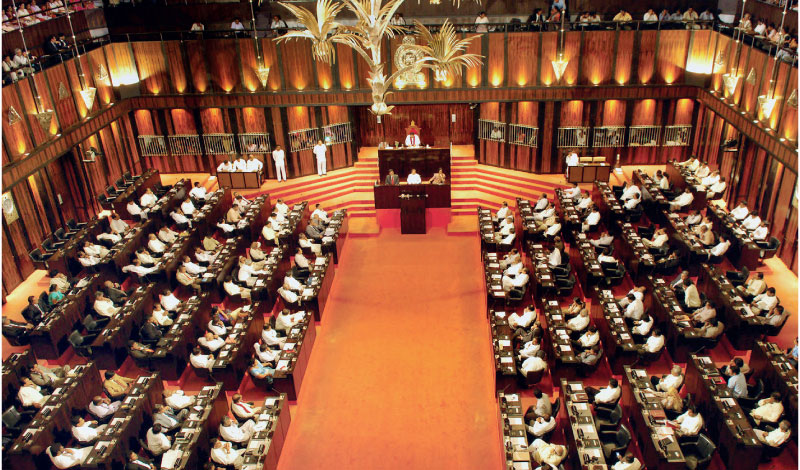Monday Feb 16, 2026
Monday Feb 16, 2026
Monday, 17 June 2024 00:35 - - {{hitsCtrl.values.hits}}

Imposing such high-sounding targets to a set of ministers with such backgrounds sounds patently absurd and wildly illogical to say the least
 We are living in an era under a high-level focus by UN authorities on the creation of a global level roadmap, with an open data platform, to commit all nations towards a Sustainable Development Goal.
We are living in an era under a high-level focus by UN authorities on the creation of a global level roadmap, with an open data platform, to commit all nations towards a Sustainable Development Goal.
This concept emerged with the Heads of State and High Representatives of Governments meeting at the United Nations Headquarters in New York from 25-27 September 2015 to celebrate its 70th anniversary, deciding on a new action program for a global Sustainable Development Goal (SDG).
The declaration adopted at this forum incorporated inter-alia the following;
“On behalf of the peoples we serve, we have adopted a historic decision on a comprehensive, far-reaching and people-centered set of universal and transformative goals and targets. We commit ourselves to working tirelessly for the full implementation of this Agenda by 2030. We recognise that eradicating poverty in all its forms and dimensions, including extreme poverty, is the greatest global challenge and an indispensable requirement for sustainable development. We are committed to achieving sustainable development in its three dimensions – economic, social and environmental – in a balanced and integrated manner. We will also build upon the achievements of the Millennium Development Goals and seek to address their unfinished business.”
It was also resolved that, between then and 2030, to end poverty and hunger everywhere; to combat inequalities within and among countries; to build peaceful, just and inclusive societies; to protect human rights and promote gender equality and the empowerment of women and girls; and to ensure the lasting protection of the planet and its natural resources. The resolution has gone further to create conditions for sustainable, inclusive and sustained economic growth, shared prosperity and decent work for all, taking into account different levels of national development and capacities.
With the proclamation of the SDG, the UN anticipated the active participation of all member countries in the program, expecting all countries; engaging the civil society to establish “shadow” Voluntary National Review forums (VNR); creating a national SDG roadmap and committing to regular SDG reporting at both the domestic and global levels; and establishing an open data platform.
No serious engagement or public dialogue
Although this commitment was made by the UN as far back as 2015, to-date we haven’t come across any serious engagement or a public dialogue in our country centred round this universal interest.
It looks an irony for the President who is the Author of this initiative in Sri Lanka today, (who also served as the Prime Minister of the country from 2015 to 2018, 2018 to 2019) not to have taken any initiative in keeping with this proclamation.
Today, Sri Lanka is preparing to pass a bill to provide for the National Policy on Economic Transformation and for the establishment of new institutions repealing certain laws to pave the way for the de-establishment of some institutions already functioning accepted and highly praised for playing important roles in the economic development activities of the country.
This Bill is now before the Supreme Court for the mandatory clearance required before it is enacted. But we see several organisations and social groups have expressed views sharing their aversions to the Bill. The basic principles underlying this Bill appear to be;
Article 4
The Cabinet of Ministers shall from 2025, prepare and present to Parliament a report every five years on the Policy Framework and strategies to give effect to the above economic transformations. The Cabinet of Ministers can also revise such reports and present them to Parliament from time to time.
The Minister in charge of the Economic Policy shall submit a progress report of the achievements every year to Parliament and if the targets as enacted are not met, fresh targets will be set informing the Parliament and these targets shall be binding according to the Bill.
Five agencies to be established to assist the Government in achieving the objectives of this rapid growth under National Economic Transformation.
Basic principles coming under the proposal
Now let us take a look at these basic principles coming under the proposal.
It will be interesting to examine the scheme of implementation in the context envisaged by the true authors of the SDG scheme, i.e. The HLPF of the UN in a Global context.
Are Development Goals legally binding?
How is it possible for Cabinet members to ensure the timely achievement of the set targets when the responsibility of performance is contingent on the dedicated agencies?
The Parliament oversight Committee will be controlling the Cabinet of Ministers according to section 8 of the Bill.
Even the UN had to accept and accordingly adjust its operational time schedules due to external influences beyond control under unprecedented situations such as the “COVID 19”. What will be the fate of the cabinet in such a situation under the stringent duty-bound responsibility falling upon them in relation to the achievement of fixed targets under the National Policy on Economic Transformation?
We as citizens and voters have witnessed the coming and going of several cabinets of ministers elected to power in this country during the last 75 to 76 years. There is no dispute that the current state of our economy is totally due to their performance as ministers during their regimes. Imposing such high-sounding targets to a set of ministers with such backgrounds sounds patently absurd and wildly illogical to say the least.Unless we open the gates and import some new characters to undertake the task, these targets will keep moving towards the horizon eternally in the most unlikely event of a totally new set of persons are destined to take over.
There are enough in our statutes beginning from the old invaluable Ordinances available to us despite which lawlessness has flourished and prospered.
Time has come to ponder over and contemplate where we are sailing to.